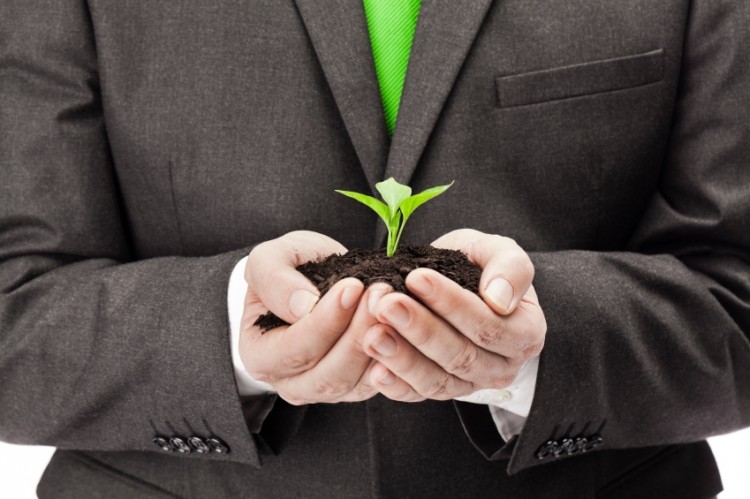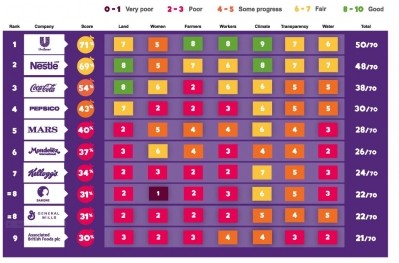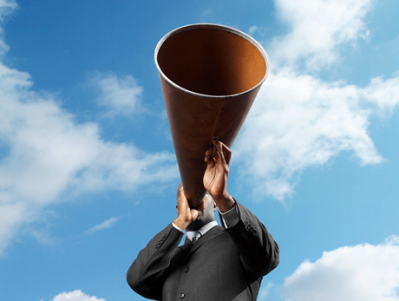Oxfam: Kellogg, Gen Mills, Pepsico not doing ‘nearly enough’ to tackle climate change

“The ‘Big 10’ food and beverage companies―Associated British Foods (ABF), Coca-Cola, Danone, General Mills, Kellogg, Mars, Mondelēz International, Nestlé, PepsiCo and Unilever―are significant emitters of greenhouse gases (GHGs) across their global operations,” wrote Oxfam in its report, titled “Standing on the Sidelines”. “If together they were a single country, these 10 famous companies would be the 25th most polluting country in the world, emitting more GHGs (263.7 million tons per annum) than Finland, Sweden, Denmark, and Norway combined.”
The NGO calls on all 10 to set clearer, more aggressive targets for emission reduction, noting that climate change not only poses risks to food supply chains and consumer demand; it will ultimately threaten food companies’ future profitability.
Half of the Big 10’s emissions attributed to supply chains, yet none require suppliers to set targets
Climate change—which is contributing to more extreme weather events worldwide—is already impacting food supplies and putting pressure on prices. The food system drives around 25% of global GHG emissions, a figure that is on track to increase as global demand for food rises.
Oxfam says the Big 10 should be capable of cutting their combined emissions by a further 80 million tons by 2020—the equivalent of taking all the cars in Los Angeles, Beijing, London and New York off the road.
While all 10 firms have set targets to reduce emissions from their operations, Oxfam slams many of these efforts as too lax and not based in science in its report. Indeed, despite that nearly half of the Big 10’s emissions come from the production of agricultural materials from their supply chains, none of them require their suppliers to set reduction targets.
Kellogg, General Mills ‘worst offenders’; Unilever, Coke, Nestle more aggressive on reduction efforts
In particular, Oxfam singles out Kellogg and General Mills as two of the worst offenders on climate—emphasizing that neither company measures or reports on its annual carbon emissions. It also flags the alleged involvement of Indonesian company PT Adei, which sells palm oil to Cargill (supplier of Kellogg, General Mills and others), in burning forest land to produce palm oil—thereby contributing to a massive forest fire that created GHG emissions equivalent to the annual emission from 10.3 million cars.
As in a previous report, Oxfam acknowledges Unilever, Nestlé and Coca-Cola as being relatively more assertive in their policies and actions to tackle climate change. Indeed, only Unilever and Coca-Cola commit to reduction targets that address emissions in their supply chains, and Mars and Nestlé are the only Big 10 companies that have committed to ambitious timelines to end deforestation in their supply chains beyond palm oil to include other commodities that drive deforestation and land use change.
Oxfam also criticizes the Big 10 (with the exception of Unilever, Coca-Cola and Mars) for not doing enough to publicly urge government and other businesses to do more to tackle climate change, including by challenging damaging or inadequate positions of trade associations that represent them.
“Too many of today’s food and beverage giants are crossing their fingers and hoping that climate change won’t disrupt the food system imagining somebody else will fix it,” said Oxfam executive director Winnie Byanyima. “The ‘Big 10’ companies generate over $1 billion a day and have great power to influence global food chains. The industry needs to do more to work towards ‘zero hunger’ in the world while undergoing a revolution in their production methods.”
Climate change will drive up retail price of Kix, Corn Flakes significantly in next 15 years
Owing largely to commodity price increases, Oxfam calculates that climate change will drive up the retail price of products like General Mills’ Kix cereal by up to 24% and Kellogg Corn Flakes by as much as 44% over the next 15 years. Commodities such as corn and rice are projected to double by 2030, with half of that increase due to climate change, Oxfam notes.
Indeed, some of the Big 10 companies are already admitting to taking financial hits due to climate change. General Mills’ CEO Ken Powell said that extreme weather dampened sales and cost his company 62 days of production, or the equivalent of 3 to 4% of production during fiscal Q3 2014. Similarly, Unilever attributes yearly losses of €300 million ($415 million) to extreme weather events such as flooding and extreme cold.
The Oxfam report is the latest installment of the NGO’s Behind the Brands campaign examining the social and environmental policies of the world’s biggest 10 F&B companies. Previous campaigns have addressed land grabs and women’s rights.






